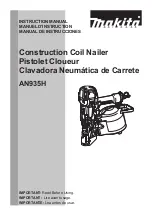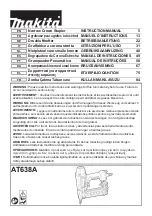
7
This value is a tool-related characteristic value and does not represent the influence to the hand-arm-system when
using the tool. An influence to the hand-arm-system when using the tool will, for example, depend on the gripping
force, the contact pressure force, the working direction, the adjustment of mains supply and the workpiece support.
OPERATION
Refer to Operation Instructions and warnings on pages before proceeding to use this tool.
THREE TYPES
OF OPERATION FOR THIS TOOL SERIES.
CONTACT TRIP :
IDENTIFIED BY BLACK TRIGGER
The common operating procedure on “Contact Trip” tools is for the operator to contact the work to actuate the trip
mechanism while keeping the trigger pulled, thus driving a fastener each time the work is contacted. This will allow
rapid fastener placement on many jobs, such as sheathing, decking and pallet assembly. All pneumatic tools are
subject to recoil when driving fasteners. The tool may bounce, releasing the trip, and if unintentionally allowed to
recontact the work surface with the trigger still actuated (finger still holding trigger pulled) an unwanted second fastener
will be driven.
SEQUENTIAL TRIP:
IDENTIFIED BY NICKEL PLATED TRIGGER
The Sequential Trip requires the operator to hold the tool against the work before pulling the trigger. This makes accurate
fastener placement easier, for instance on framing, toe nailing and crating applications. The Sequential Trip allows
exact fastener location without the possibility of driving a second fastener on recoil, as described under “Contact Trip”.
The Sequential Trip Tool has a positive safety advantage because it will not accidentally drive a fastener if the tool is
contacted against the work – or anything else – while the operator is holding the trigger pulled.
REMOTE FIRE:
IDENTIFIED BY CONTROL VALVE AIR INLET
If trigger system is not operating as described, do not use the tool and
contact your nearest service center.






























